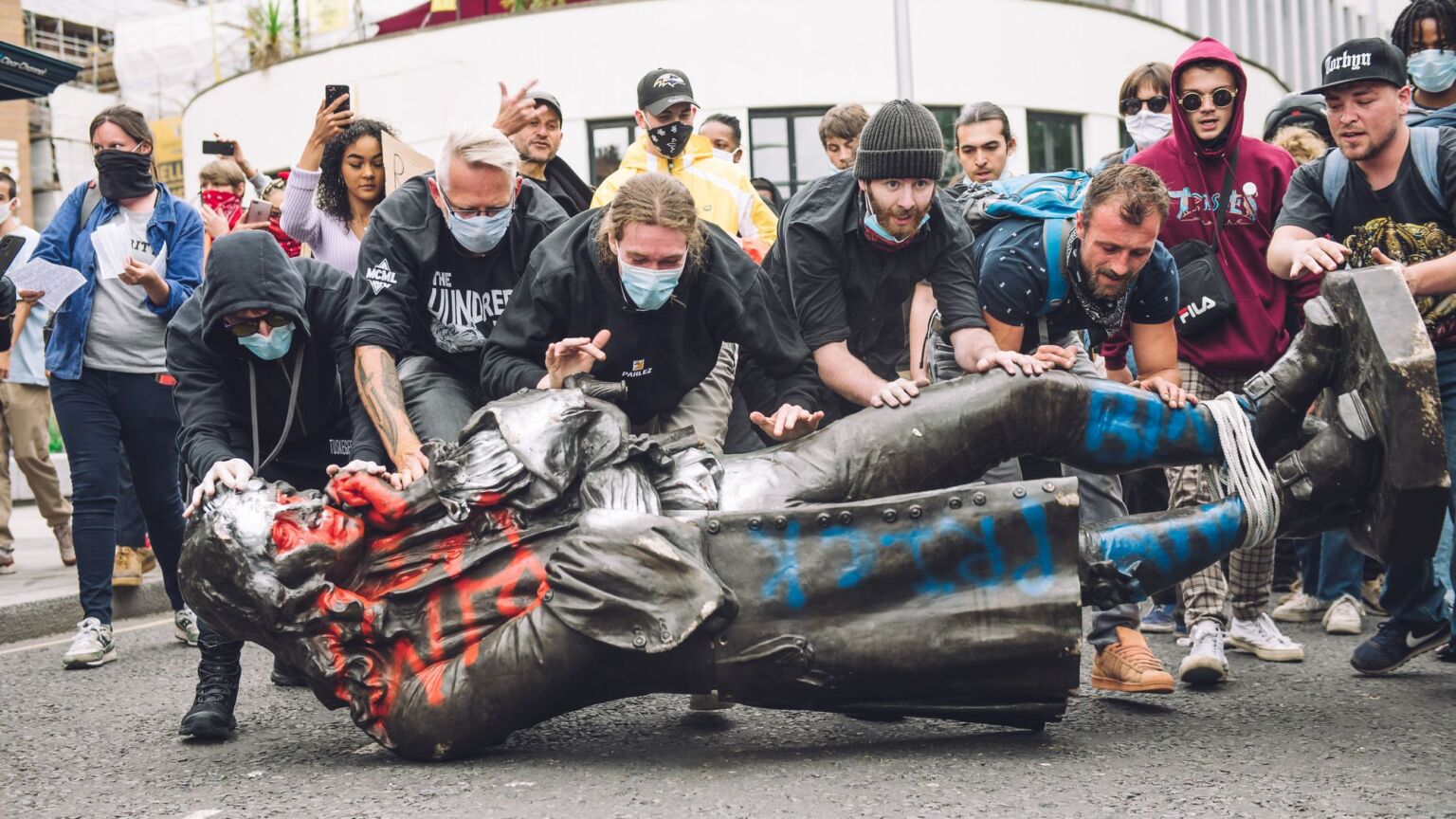Dead, white men are being punished for imagined thoughtcrimes
Memorials to men who may have held ‘discriminatory beliefs’ are in Camden Council’s sights.

Want unlimited, ad-free access? Become a spiked supporter.
Banishing white men from television adverts is apparently not enough for today’s anti-racist activists. Not content with distorting representations of the present, they want to demonise white men from the past, too. They have statues, plaques and the names of streets and buildings firmly in their sights.
The leaders of Camden Council have been upset to discover that London’s streets are littered with reminders of the existence of dead white men. But perhaps not for much longer, as the Labour-run council has declared war on statues of ‘white male oppressors’. Proud of their newly acquired insights, council staff have even produced a guide so that other organisations, such as Arts Council England, English Heritage and Historic England, can also scrub the past clean.
At first glance, it’s hard to see what is actually new about this crusade. In the five years since Black Lives Matter first made tearing down statues fashionable, multiple monuments have been removed from towns and cities across Britain. Anyone tinged by association with the slave trade or empire has long been for the chop. A statue of Edward Colston was brought down by protesters, daubed with paint and thrown into the River Avon in Bristol. A petition led to the removal of a monument to Robert Milligan from outside the Museum of London Docklands. Thomas Picton’s statue in Cardiff is no more.
Elsewhere, statues are ‘under review’. In Edinburgh, a statue of former prime minister William Pitt the Younger is under suspicion, even though Pitt challenged slavery. Economist Adam Smith’s statue is slated for the chop, as is that of politician Henry Dundas. Monuments that survive the onslaught are made to suffer the indignity of ‘interpretation panels’ – plaques that point out sins committed by the honoured men. So Francis Drake may have circumnavigated the globe and played a leading role in the defeat of the Spanish Armada. But, in his hometown of Plymouth, a statue to this naval hero is accompanied by a board noting that, in the early years of his career, he helped trading vessels carrying slaves to cross the Atlantic. This is deemed significant, despite the fact that Drake not only played a very minor role in such voyages, but he also actually liberated some African slaves in South America.
If all this has been going on for some time, what has Camden got to offer that is new? It turns out that the London council has devised a means of assessing the sins of immortalised men based not on what they did, for good or ill, but on what they might have thought. Camden’s guide to reviewing memorials to historical figures encompasses those who may have privately held ‘discriminatory ideas’. Clearly, staff at Camden Council have psychic powers that enable them to read the minds of long-dead men. Revealing the unconscious bias of the dead is truly quite the skill. Forget old statues, perhaps we need monuments to honour the gifted individuals in local government who currently walk among us.
Only, it turns out, you don’t need to be psychic to access the private thoughts of dead men after all. Council employees have found a helpful shortcut. The guidance they have come up with warns that pretty much all figures from ‘white, male-dominated spheres of public life’ are bound to have entertained ‘prejudiced beliefs about ethnicity, faith, gender, disability and sexuality’. In other words, if you were a white man or ever worked with white men, then your private thoughts are bound to have been bad.
Clearly, there is some truth in the idea that people’s thoughts are shaped by the historical era and circumstances they find themselves in. Drake did not fly the ‘Progress Pride’ flag on the Golden Hinde, and William Pitt the Younger did not take the knee for Black Lives Matter. It would be historically illiterate to think they might have done so. But ignorance is no barrier to the zealots in Camden Council who think dead white men should be punished simply for thinking in line with their contemporaries.
Camden Council will not stop until all public artworks and memorials are ‘truly inclusive and representative of our diverse and vibrant communities’ – or, to put it more truthfully, until every last monument to a white man has been torn down. And it’s not just men, either. Camden’s activist employees have added information to a statue of novelist Virginia Woolf to point out her ‘imperialist attitudes and offensive opinions’.
It is tempting to tell Camden Council to leave the past alone. But this is to give its staff too much credit. This campaign has nothing to do with history and everything to do with today’s racial identity politics. All of this says far more about the guilty thoughts of the white men who are pushing such initiatives – those who head up councils and marketing companies – than it does about the vast majority of white men as a whole. After all, those ordinary men are today, just as in the past, simply trying to do the best by themselves and their families, in circumstances that are not of their choosing.
Joanna Williams is a spiked columnist and author of How Woke Won. Follow her on Substack: cieo.substack.com.
£1 a month for 3 months
You’ve hit your monthly free article limit.
Support spiked and get unlimited access.
Support spiked – £1 a month for 3 months
spiked is funded by readers like you. Only 0.1% of regular readers currently support us. If just 1% did, we could grow our team and step up the fight for free speech and democracy.
Become a spiked supporter and enjoy unlimited, ad-free access, bonus content and exclusive events – while helping to keep independent journalism alive.
———————————————————————————————————————————–
Exclusive January offer: join today for £1 a month for 3 months. Then £5 a month, cancel anytime.
———————————————————————————————————————————–
Monthly support makes the biggest difference. Thank you.









Comments
Want to join the conversation?
Only spiked supporters and patrons, who donate regularly to us, can comment on our articles.